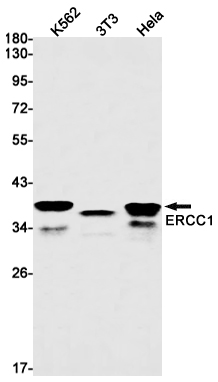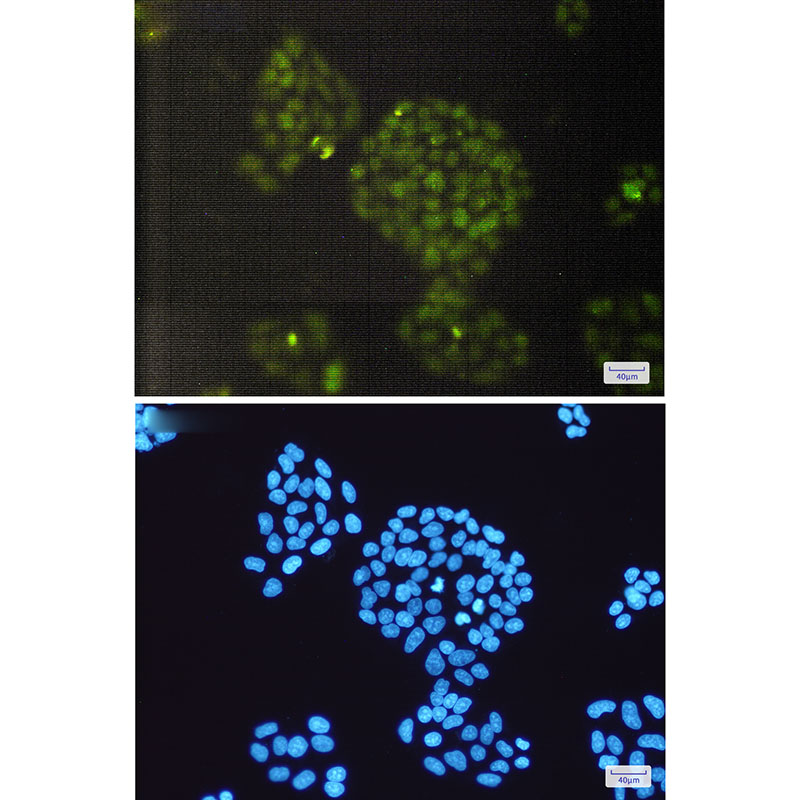

| WB | 咨询技术 | Human,Mouse,Rat |
| IF | 咨询技术 | Human,Mouse,Rat |
| IHC | 咨询技术 | Human,Mouse,Rat |
| ICC | 1/50-1/200 | Human,Mouse,Rat |
| FCM | 咨询技术 | Human,Mouse,Rat |
| Elisa | 咨询技术 | Human,Mouse,Rat |
| Aliases | ERCC1; DNA excision repair protein ERCC-1 |
| Entrez GeneID | 2067 |
| WB Predicted band size | Calculated MW: 33 kDa; Observed MW: 39 kDa |
| Host/Isotype | Rabbit IgG |
| Antibody Type | Primary antibody |
| Storage | Store at 4°C short term. Aliquot and store at -20°C long term. Avoid freeze/thaw cycles. |
| Species Reactivity | Human,Mouse |
| Immunogen | A synthetic peptide of human ERCC1 |
| Formulation | Purified antibody in TBS with 0.05% sodium azide,0.05%BSA and 50% glycerol. |
+ +
以下是3-4条关于ERCC1抗体的参考文献及其简要摘要:
---
1. **文献名称**:*DNA Repair by ERCC1 in Non–Small-Cell Lung Cancer and Cisplatin-Based Adjuvant Chemotherapy*
**作者**:Olaussen, K.A. et al.
**摘要**:该研究(2006年发表于*NEJM*)通过免疫组化检测非小细胞肺癌(NSCLC)患者肿瘤组织中ERCC1蛋白的表达,发现ERCC1阴性患者接受顺铂辅助化疗后生存期显著延长,提示ERCC1抗体可作为铂类药物疗效预测的生物标志物。
2. **文献名称**:*ERCC1 Expression as a Predictive Marker of Survival in Colorectal Cancer Patients Treated with Oxaliplatin*
**作者**:Wei, J. et al.
**摘要**:研究(2007年发表于*JCO*)利用ERCC1抗体进行免疫组化分析,发现ERCC1高表达的结直肠癌患者对奥沙利铂化疗反应较差,且总生存期较短,支持ERCC1在指导个体化化疗中的潜在价值。
3. **文献名称**:*Validation of ERCC1 Antibodies in Paraffin-Embedded Tissues for Prognostic Studies in Lung Cancer*
**作者**:Cobo, M. et al.
**摘要**:该研究(2007年)比较了不同ERCC1抗体(如8F1克隆抗体)在福尔马林固定石蜡包埋肺癌组织中的检测一致性,发现抗体选择显著影响结果,强调标准化检测方法对临床预测的重要性。
4. **文献名称**:*Discrepancies in ERCC1 Antibody Specificity Impact Clinical Outcomes in Lung Cancer Trials*
**作者**:Booton, R. et al.
**摘要**:文章(2006年)指出不同ERCC1抗体的靶向表位差异可能导致研究结果矛盾,呼吁在临床试验中严格验证抗体特异性,以确保生物标志物分析的可靠性。
---
这些文献涵盖了ERCC1抗体在癌症预后、化疗反应预测及检测方法标准化中的关键研究,反映了其在转化医学中的应用与挑战。
ERCC1 (Excision Repair Cross-Complementation Group 1) is a critical protein involved in nucleotide excision repair (NER), a DNA repair pathway that removes bulky DNA adducts caused by UV radiation, environmental carcinogens, or chemotherapeutic agents like cisplatin. ERCC1 forms a heterodimer with XPF (xeroderma pigmentosum group F) to function as an endonuclease, cleaving damaged DNA strands during repair. Its role in maintaining genomic stability makes it a biomarker of interest in cancer research, particularly in predicting responses to platinum-based chemotherapy. Tumors with low ERCC1 expression are often associated with better therapeutic outcomes, as deficient DNA repair may enhance chemotherapy-induced cytotoxicity.
ERCC1 antibodies are widely used in research and clinical settings to detect and quantify ERCC1 protein levels in tissues or cell lines via techniques like immunohistochemistry (IHC), Western blotting, or immunofluorescence. These antibodies help assess DNA repair capacity, evaluate chemoresistance mechanisms, and guide personalized treatment strategies. However, challenges remain in standardizing ERCC1 detection due to variability in antibody specificity, particularly with commonly used clones (e.g., 8F1), which may cross-react with unrelated proteins or fail to distinguish functional ERCC1 isoforms. Discrepancies in clinical studies linking ERCC1 levels to patient outcomes have also sparked debates about its reliability as a standalone predictive biomarker.
Ongoing research focuses on refining antibody validation methods and exploring ERCC1’s interactions within DNA repair complexes to improve its clinical utility in oncology.
×